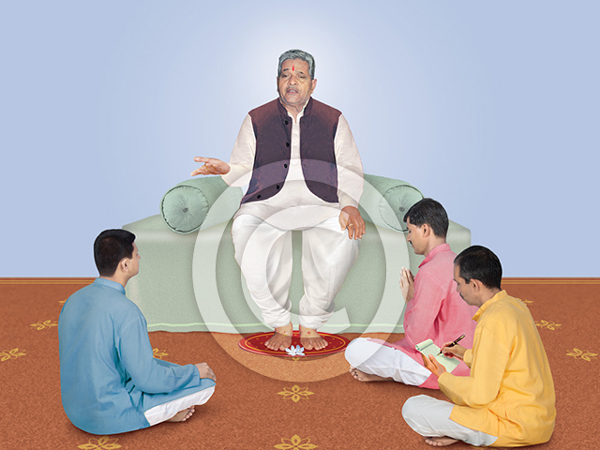In the present birth, everyone seeks guidance from teachers, doctors, lawyers etc. for simple aspects. If this be so, it is really beyond our imagination to understand the importance of the Guru, the one who releases us from the cycle of birth and death. One should surrender unto the Guru, so that the Guru can control his mind till its dissolution. Surrender unto the Guru completely and then leave the rest to Him. The Guru is aware of the disciple’s progress. The Guru consciously bestows His grace on the devotee through His eyes, words or touch continuously. This grace is bestowed upon the disciple by the Guru’s efforts. This article elaborates the significance of the Guru and the importance of Guru.
1. Glory of the Guru and importance of Guru
-
A father is merely responsible for the birth of a son. It is the Guru who releases him from the cycle of birth and death. Hence, the Guru is considered superior to the father.
-
An individual who is in bondage cannot emancipate another individual in the same state. A Guru is already liberated, so He can emancipate His disciples.
-
In one of His verses, Saint Tukaram has said that, unless we obtain a Sadguru, we cannot find the path to Moksha (Final Liberation). Hence, we should first hold His feet, that is, we should make efforts to obtain His grace. The Sadguru instantly makes a disciple akin to Himself, that is, worthy of Moksha. The greatness of the Sadguru is unfathomable, and even calling Him a Pāras is inadequate to describe His greatness. Saint Tukaram Maharaj further asks, ‘Why are people blind ? They have completely forgotten God (Sadguru)’.
-
Saint Dnyaneshwar (Dnyāndēvgāthā, Abhang 698, Ovī 1) says, ‘One who has not acquired knowledge from Shrī Guru has no way of attaining liberation from worldly life. Since Shrīhari dislikes him, it is as if his birth has gone in vain.
-
Saint Dnyaneshwar (Haripāthā, Abhang 5, Ovī 1, 2) says, ‘One can never realise God by following Yoga or performing Yadnya, as they only increase the ego. Undoubtedly, knowledge of the Supreme being is not acquired without bhāv (Spiritual emotion). Then, how can one obtain spiritual experiences without the Sadguru ?’
-
Shrī Shankarāchārya has said, ‘There is no title suitable in all the three worlds for a Sadguru. Calling Him a Pāras will also be inadequate; because, though the Pāras converts iron into gold, it cannot impart its quality to the metal.’ Samartha Ramdas Swami says in Dāsbodh (Dashak 1, Samās 4, Ovī 16), ‘Disciples can attain the state of a Guru; but a Pāras cannot convert everything into gold. Hence, comparing a Sadguru with a Pāras is inappropriate.
-
Hindu culture has placed the Guru on a higher pedestal than God; because, it is not God, but the Guru who teaches spiritual practice to the seeker for God-realisation, gets it done from him and also helps him realise God.
2. According to psychology
-
Unlike Deities who do not display their existence and potential, the disciple can concentrate more on the Guru who is able to display these for the sake of the disciple’s progress.
-
Since the disciple gets the spiritual experience that the Guru perceives everything due to His omniscience, he often refrains from doing bad deeds.
-
Making the disciple remember the Guru : Some seekers desirous of knowledge feel, “Why does His Holiness Bhaktaraj Maharaj just go on talking instead of teaching the disciple something on Spirituality ?” When asked this question, Baba replied, “I tell a disciple that I like bhajīās or thālīpītha so that at least when he is preparing that dish at home he remembers me and it reminds him to chant God’s Name.”
-
Instead of letting the disciple develop an inferiority complex (due to the Guru’s superiority), the Guru eliminates the inferiority complex in the disciple and grants him the all-encompassing status of the Guru.
3. According to the science of Spirituality and importance of Guru
3A. Visiting the Guru
Only when the Guru reminds the disciple of Himself can the disciple visit Him.
3B. Overcoming adversities due to the Guru
-
Due to the human nature, some devotees would approach Raman Maharshi to overcome their worldly suffering. They believed that He would help them when in distress just like their parents did. Such devotees would either write letters or pray to Him. The result was that at least the obstacle would be overcome and if the problem would be inevitable, the devotee would at least obtain some mental peace or the strength to endure it. This would take place automatically; not because Raman Maharshi wished so, but because of the continuous flow of the Guru’s grace due to the devotee’s faith and surrender unto Him. If anyone would begin to debate this topic, Raman Maharshi would say, “I am not even aware of these aspects — worldly problems — and I do not do anything intentionally. All this happens automatically.”
-
It is the Guru alone who takes the devotee out of worldly activities of Māyā (The Great Illusion) swiftly, supports him lovingly in the hour of need and rids him of adversities.
3C. Destiny and Guru
-
With the grace or blessings of the Guru, the control of prārabdha (destiny) over aspects of the individual’s life comes into the hands of Deities.
-
One acquires the ability to face mild destiny with moderate spiritual practice, moderate destiny with intense spiritual practice and severe destiny only with the Guru’s grace.
3D. Making a disciple self-enlightened instead of making him a mere medium
When someone acts as a medium he cannot make spiritual progress. He remains influenced by someone else. On the contrary, when a Guru gets His mission accomplished though a disciple, He increases the ability of that disciple, just like Shrī Ramkrushna did – He first increased Vivekanand’s spiritual prowess and only then got His mission fulfilled through him.
3E. Disciple’s progress takes place by the mere presence of the Guru
Flowers blossom as soon as the sun rises. The sun does not tell the flowers to blossom. Similarly, by the mere presence of the Guru, the disciple’s progress takes place.
3F. Teaching to refrain from siddhīs (Supernatural powers)
The reasons for this are provided ahead.
-
As the individual makes spiritual progress, he automatically acquires supernatural powers.
-
At this stage, the disciple has to learn that he has to overcome the temptation to use these powers and not get entrapped in them.
-
According to the need of the mission if the use of supernatural powers is necessary, then the Guru makes them available.
3G. Broad importance of Guru
Just as a prey caught in the jaws of a tiger is not released, so also the one on whom the Guru’s grace is bestowed is not set free by the Guru till he attains Moksha. If a disciple goes to Hell, then the Guru will follow and bring him back. The Guru is within as well as without. The Guru creates a state in which one becomes introverted. The Guru also prepares from within, that is, in the heart to attract one towards the soul (towards Brahman). One should surrender unto the Guru, so that the Guru can control his mind till its dissolution. Surrender unto the Guru completely and then leave the rest to Him.
The two paths towards spiritual progress are the search for ’Who am I ?’ and surrender unto the Guru. It is not as easy as it seems to keep the mind calm and to surrender to the Guru and await His grace. It is necessary to remember the Guru continuously. This is possible only by the Guru’s grace. The mother feeds her sleeping child at night. However, the next day the child feels it has not eaten anything. Only the mother knows that the child drank milk the previous night. Similarly, the Guru is aware of the disciple’s progress. The Guru consciously bestows His grace on the devotee through His eyes, words or touch continuously. This grace is bestowed upon the disciple by the Guru’s efforts. A disciple too should make incessant efforts to take full advantage of this grace. The thought of ‘Who am I’ is itself the real effort.
The Maharshi has said “A Guru will even go to Hell for the sake of His disciple”. This is only to give psychological support to the disciple. The Guru does not let His disciple commit mistakes which will land him in Hell. However, if he does commit mistakes, He allows the disciple to pay for them.
Reference : Sanatan Sanstha’s Holy Text on ‘Importance of Guru, types and Gurumantra’



 What is a guru and How to Find Him?
What is a guru and How to Find Him? The Guru-disciple relationship
The Guru-disciple relationship Difference between Guru and Teacher - Is 'Guru' superior to a teacher, a preacher or a Saint?
Difference between Guru and Teacher - Is 'Guru' superior to a teacher, a preacher or a Saint? Qualities of a disciple
Qualities of a disciple Spiritual disciplines in Disciple’s life
Spiritual disciplines in Disciple’s life Guru Shishya relationship and How one should behave with the Guru ?
Guru Shishya relationship and How one should behave with the Guru ?